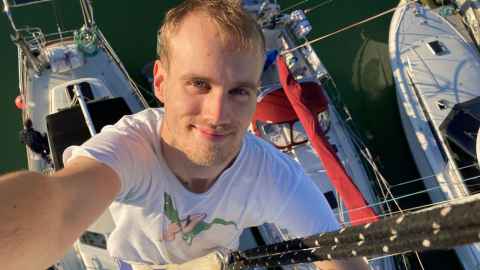Sam Modern
Sam is pursuing a PhD, aiming to characterise and discuss the mechanisms that control reproduction in a specific fish species.

PhD candidate with the School of Biological Sciences
Research area: The molecular and endocrine mechanisms that direct
the reproductive cycle in the teleost fish Tāmure/Australasian snapper.
My current PhD project focuses on the molecular and endocrine mechanisms that direct the reproductive cycle in the teleost fish Tāmure/Australasian snapper. This project captured my attention as it promised to combine the areas of work I had pursued in my career since graduating – namely molecular and data-driven biology with the areas of work that I focused on during my undergraduate/master’s degree, marine reproductive biology.
I have gathered transcriptomic data from many different tissues throughout the body which are responsible for directing reproductive processes and am combining this with physiological data and observations as well as measurements of various hormones related to reproduction. My aim is to characterize and discuss the mechanisms that control reproduction in this specific fish species.
What I enjoy most about working on my current PhD project is my colleagues at the PFR Nelson site. Our site here is friendly and small enough for everyone to know each other, and there is a real sense of community and team spirit here.
I would like to mention the supportive and friendly approach to supervision that my supervisors: Maren Wellenreuther; Matt Wylie and Craig Radford have. Maren frequently involves her PhD students in the meetings and socials for her lab group, and does a great job at making her students feel like important members of her team.
Another part of my research that I really enjoy is using my skills in data analysis to investigate the reproductive biology of snapper. Fish have very varied and often quite unique reproductive biology. Snapper undergo juvenile sex inversion, with some turning from females to males in adolescence. I find using molecular biology to investigate the biology behind reproduction in this species fascinating.
I’ve let life take me in unusual directions before, like when I graduated just before the pandemic and took the unexpected opportunity to start working in molecular laboratories working with COVID. During the pandemic, my work ranged from routine qPCR diagnostic testing to data science/software engineering, where I was helping to track variants and the nationwide patterns in COVID-19. This work was very different from my previous studies; however, it provided me with the skills and experience to begin my current work studying snapper. I hope my future upon obtaining my PhD, which is expected to be complete by November 2025, will be similarly unpredictable but interesting.